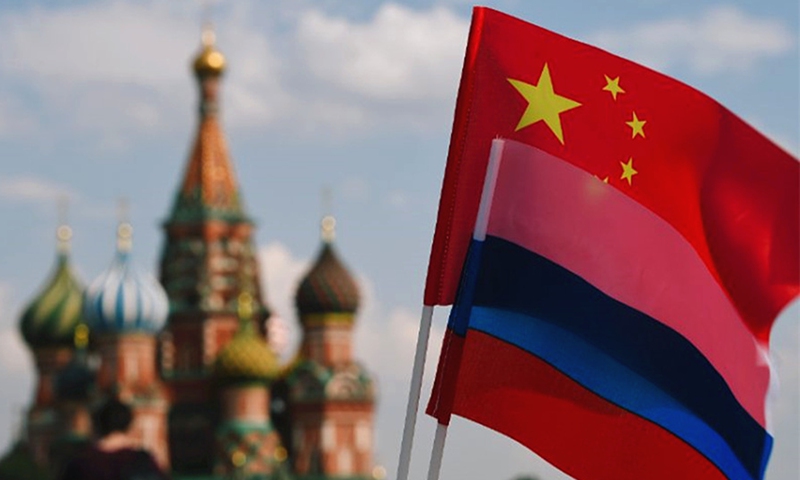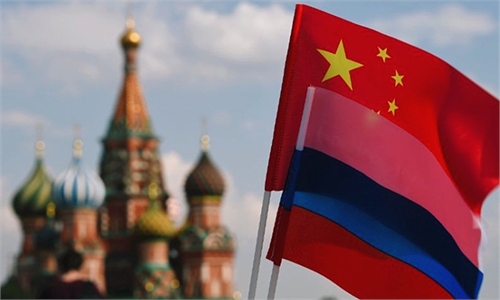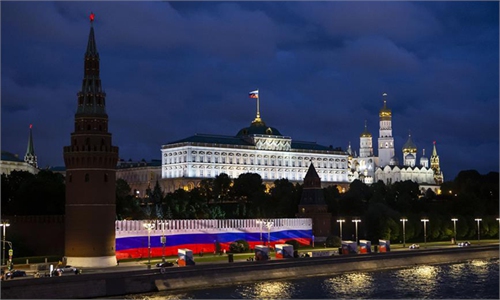Xi, Putin to witness opening of nuclear energy project
China, Russia draw closer amid worsening US ties

China Russia Photo:Xinhua
Chinese President Xi Jinping and Russian President Vladimir Putin will witness the groundbreaking ceremony of bilateral nuclear energy cooperation together via a video link on Wednesday, the Chinese Foreign Ministry announced on Tuesday.
The cooperation in China-Russia civilian nuclear technology is further validation that the two countries are moving closer in the face of escalating US sanctions and restrictions, observers said on Tuesday.
At a regular press conference on Tuesday, Chinese Foreign Ministry spokesperson Zhao Lijian noted the event would be the first bilateral online interaction between the two leaders in 2021, and would be significant in guiding the high-quality growth of the China-Russia comprehensive strategic partnership of coordination in the new era.
Having achieved rapid growth in recent years, the development of nuclear energy cooperation has been a priority for China-Russia cooperation, and received the attention of leaders from both countries, Zhao noted.
Zhao said the smooth construction work of four nuclear generating units - two at Tianwan Nuclear Power Plant in East China's Jiangsu Province and two at Xudapu Nuclear Plant in Northeast China's Liaoning - is a major fruit of China-Russia cooperation in high-end equipment manufacturing and scientific innovation, and will help promote and upgrade bilateral cooperation in other sectors. The cooperation is the largest nuclear energy cooperation project between the two countries, according to Zhao.
Li Xin, director of the Center for Russian and Central Asia Studies at the Shanghai Institutes for International Studies, said China and Russia have been seeking mutual support in the face of US crackdowns in recent years.
"High- and new-technology sector has been a key sector," Li said. "And China could replace some US technology with Russian ones in the face of rising technological and trade restrictions from the US."
Han Xiaoping, chief analyst at energy industry website china5e.com, told the Global Times on Tuesday that amid the continuous sanctions and crackdowns by the US against Russia and China, the countries actually inched closer in relations and are now like two giants relying on each other.
Han noted that against the backdrop of an encirclement strategy by the US and its allies, China-Russia energy cooperation will help boost the two country's energy security, and energy trade will provide more impetus to the two countries' goal to further increase bilateral trade.
Trade between China and Russia has returned to positive growth in the first four months of this year as the negative effect of the pandemic waned, with January to April trade reaching $40.21 billion, a year-on-year increase of 19.8 percent, China's Ministry of Commerce said last week.
With improved trade, the ministry predicted bilateral trade will reach a new high in 2021.
"Technically, the event is significant in that it means the Russian-developed third-generation VVER-1200 nuclear technology has passed China's technical review, the world's most stringent, given China's grasp of third-generation technology," Han said.
"One of the hallmarks of third-generation nuclear technology is that it is safe, that there won't be accidents such as those in Chernobyl and Fukushima," Han said, noting that Russian safety design is more prudent than Western companies.
It was reported that the four reactors have a contract value of 20 billion yuan, while the total project cost could surpass 100 billion yuan.
Executives from China National Nuclear Power Co., a listed subsidiary of CNNC, told investors in April that construction for the No.7 and No.8 reactors of Tianwan station is expected to begin this month.
The No.7 reactor at Tianwan is likely to be the first to be constructed and work will begin every five months from now, according to media reports on Tuesday.
The fruition of the VVER-1200 technology in China will add to China's status as a testing ground for the world's third-generation nuclear technologies, and put Russian technology in competition with homegrown third-generation Hualong One technology, as well as those developed by Westinghouse and Europe-based Orano.
Han said energy cooperation between China and Russia also includes natural gas, oil, and coal. And nuclear fuel could also be an emerging sector given the potential ban on exports by the UK and France.
As of April, the number of nuclear power units in operation in the Chinese mainland had reached 49, ranking third globally, according to data from the Chinese National Energy Administration. China also has 19 nuclear power units approved for or under construction.
In 2020, nuclear energy power generation accounted for 4.9 percent of China's power generation.




